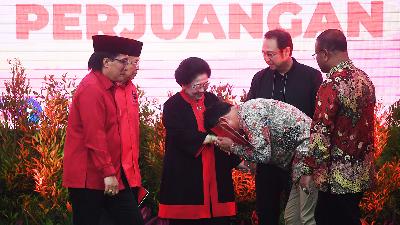Nepotism in Javanese Philosophy
Monday, August 26, 2024
It is natural for someone to want their children, relatives, or close friends to get a position. However, facilitating them to receive that position at the expense of ethics, law, and justice, it may end up in practices of nepotism.
arsip tempo : 174487458540.

Javanese Philosophy and Nepotism
THE recent political climate, when viewed through the Javanese philosophy, might bring a smile. The Javanese people, especially in the past, evaluated someone as a work partner, leader, or even a spouse through the concept of bibit (lineage), bebet (socio-economic status), bobot (personality and education). Bibit is clear, it refers to the inherent qualities or background. Bebet concerns communication skills, being positively assessed, respected, and honored by the community. Meanwhile, bobot encompasses quality, attitude, and behavior, including education, emotional maturity, intelligence, and creativity.
Another Javanese philosophy that can be related to the above is “ngono yo ngono, ning ojo ngono” (that’s how it is, but don’t let it be that way). It is natural for someone to want themselves, their family, or close friends to attain high positions. However, such desires or ambitions should not exceed reasonable limits or violate ethics, formal laws, social norms, and cultural values.
Soenán Hadi Poernomo
Pasar Minggu, South Jakarta
Disappointed with Royaltrans S31's Services
AS a loyal user of the Transjakarta bus (Royaltrans S31 of the Bintaro-MRT Fatmawati route) since 2019, I am disappointed with the recent service. The buses often depart about 30 minutes earlier than the scheduled time, especially during peak hours from 6:15am to 7:45am. For example, a bus scheduled to depart at 7:45am frequently leaves at 7:15am because it is already full. This is very inconvenient as it complicates passengers’ efforts to adjust their schedules.
I hope the Royaltrans management will address this issue and take corrective action. One solution could be to increase the number of buses during peak hours, particularly from 6am to 7:30am. This would help accommodate the growing number of passengers and reduce the likelihood of buses departing earlier than scheduled. After all, this aligns with the government’s desire to encourage more people to use public transportation.
Ridho
Bintaro, South Tangerang, Banten
Donation via Credit Card
IN 2004, at Pasar Modern Batununggal Indah, Bandung, I was approached by two teenage girls who offered me the chance to become a voluntary donor for the United Nations Educational, Scientific and Cultural Organization (UNESCO). The donation was to be made automatically through a Citibank credit card at a rate of Rp100,000 per month and was set to last for one year. About six months ago, Citibank ‘delegated’ its retail network, including credit cards, to Bank UOB Indonesia. What started as a voluntary donation has now become impossible to stop.
At the time of the transition from Citibank to UOB, I had already canceled my UOB credit card. My pension, amounting to around Rp4 million, is insufficient to cover donations and daily living expenses. I have called the UNESCO office in Jakarta to stop the donations, but there has been no response. Meanwhile, UOB debt collectors have been harassing me for wanting to halt the charges. Given this situation, what am I supposed to do?
Sophan Y. Warnasouda
Bandung, West Java











